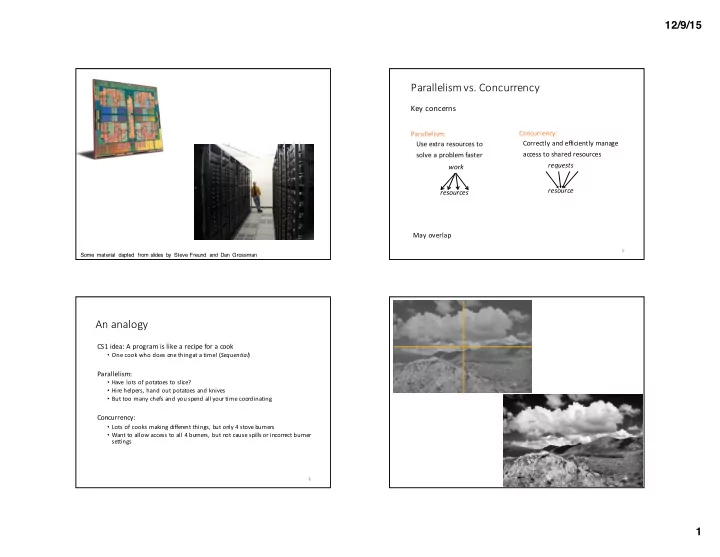

12/9/15 Parallelism ¡vs. ¡Concurrency Key ¡concerns Concurrency: Parallelism: Correctly ¡and ¡efficiently ¡manage ¡ Use ¡extra ¡resources ¡to ¡ access ¡to ¡shared ¡resources solve ¡a ¡problem ¡faster requests work resource resources May ¡overlap 2 Some material dapted from slides by Steve Freund and Dan Grossman An ¡analogy CS1 ¡idea: ¡A ¡program ¡is ¡like ¡a ¡recipe ¡for ¡a ¡cook • One ¡cook ¡who ¡does ¡one ¡thing ¡at ¡a ¡time! ¡( Sequential ) Parallelism: • Have ¡ lots ¡of ¡potatoes ¡to ¡slice? ¡ • Hire ¡helpers, ¡hand ¡out ¡potatoes ¡and ¡knives • But ¡too ¡many ¡chefs ¡and ¡you ¡spend ¡all ¡your ¡time ¡coordinating Concurrency: • Lots ¡of ¡cooks ¡making ¡different ¡things, ¡but ¡only ¡4 ¡stove ¡burners • Want ¡to ¡allow ¡access ¡to ¡all ¡4 ¡burners, ¡but ¡not ¡cause ¡spills ¡or ¡incorrect ¡burner ¡ settings 3 1
12/9/15 Count ¡Words A.html <cow,5> Count <moo,3> cow:28 cow:<5,23> Sum List B.html <wombat,15> <cow,23> Sum List moo:3 Count moo:<3> <the,3> www.bank.com SORT Sum List the:35 the:<11,3> ... wombat:16 Account wombat:<1,15> Sum List Info C.html purple:3 purple:<3> <wombat,1> Sum List <purple,3> Count <the,11> 5 Message-‑passing, ¡actors, ¡"shared ¡nothing" Shared-‑Memory ¡Multithreading C Implicit ¡communication ¡through ¡sharing. Shared : heap ¡and ¡ Network globals A Communication ¡via ¡explicitly ¡ Threads/processes/actors ¡ sending/receiving ¡messages. have ¡their ¡own ¡private ¡state. Unshared : B locals ¡and control pc pc pc 2
12/9/15 Dataflow Data ¡Parallelism apply ¡function/operation to ¡every ¡element ¡of ¡array ¡in ¡parallel X W V Z Y Programs ¡are ¡DAGs. Nodes ¡are ¡functions/operations. Node ¡executes ¡after ¡predecessors. 13 14 do i=1, n z(i) = x(i) + y(i) enddo cobegin x = sumRange(0,n/2) || y = sumRange(n/2,n) end z(1) = 1 do i=2, n z = x + y z(i) = z(i-1)*2 enddo z(1) = 1 do i=2, n z(i) = z(1)*2**(i-1) enddo 3
Recommend
More recommend